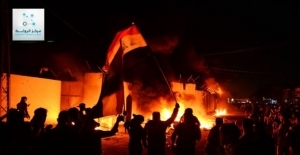Researcher Shatha Khalil *
The political , religious and social influence that Iran has built in Iraq over the past 16 years , has begun to crack terrifying the Tehran mullahs , especially since this rift in Iranian influence came popular , not political , which is a great loss that it is impossible for Iran to compensate or correct it .
Iran’s power in Iraq comes from most of the current politicians and the parties that came from Iran, and therefore, with the Iraqi people’s rejection of this corrupt class, the rejection extended to those who support this political class, which is Iran, stressing that the Iraqi youth and by their insistence to root out the entire political class in Iraq, Iran will lose all its political gains in the country within a short period.
This means that if Iran loses Iraq, its loss will extend to Lebanon, Syria and Yemen, as its influence in these countries came after the American invasion of Iraq and after its influence over it.
For some time, Iran imagined that it controlled the capabilities and economy of Iraq, through its agents and arms who work to serve its goals in Iraq. However, the Iraqi soul and the authentic Arab spirit of the Iraqi people reject any Iranian hegemony, or in curbing the corruption that Iran has established its networks and tails.
In the language of malicious Iranian interference in the internal affairs of Iraq, the network of alliances that Tehran has built in recent years means that it has an important advantage over its opponents when wars are required, as it relies heavily on its influence and its militias in Iraq.
Informed sources say that the Khafaga tribes – which are one of the major Shiite tribes in southern Iraq – serve as a model of two main parts, one of which explains how the tribes are heading towards pro-Iran, which is the strongest bet in the conflict, and the other explains how Tehran’s attempts to pressure them can lead to opposite results .
Some of the tribes most closely related to this talk are mostly Shiite, but other tribes are more diversified to include large Sunni factions, and some of these tribes are currently underestimating the importance of sectarian differences, and by adopting a unified approach more in response to the growing anger over the pressure from Iran and its agents, a sense of neglect on the part of Baghdad, and continuing security concerns.
The Iraqi street strongly rejects the Iranian presence and dirty interference in the Iraqi internal affairs, as it recently burned the Iranian consulate in the Iraqi city of Karbala, and removed the Iranian flag and raised the Iraqi flag.
Protesters also launched attacks on militia bases loyal to Iran in Nasiriyah and Diwaniyah.
Iran is not welcome in Iraq:
Research reports indicate that Iran may eventually resort to the option to negotiate the size and strength of its influence networks in Iraq, in the event that protests and unrest extend and continue, but it will seek to withstand and resist change and popular pressure campaigns by supporting its proxies, given that divided societies and weak states become an easy prey and catcher for the Iranian influence.
That is why western studies centers recommend supporting state institutions in the Middle East, in order to serve the national interests of the state, which is the first line of defense against attempts of the external influence, and that confronting Iranian influence must be based on this strategy.
However, regardless of Iran’s desperate attempts to maintain its influence in the region, the message came out loud and clear throughout the Arab world, whether from Iraq or Lebanon, which is that Iran’s pursuit of interference in the internal affairs of the Arabs, is not welcome.
In the same context, the American writer Smith says that American policymakers who seek to keep Shi’ite and Sunni tribes away from Iran are required to address the real issues that the Iraqis are currently focusing on .
For example – and the talk is still for Smith – the United States, which has long focused on providing security and military solutions to the Baghdad government, should demonstrate its soft and rough power in the face of Iran, by paying greater attention to retraining and equipping some sectors of the local Shi’a tribes, and giving them the necessary means to express their concerns and problems.
Economic Studies Unit
Rawabet Center for Research and Strategic Studies

